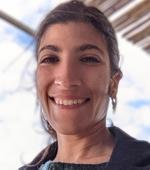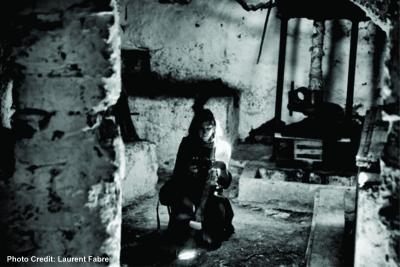Benessaiah, Karina

 I am a human-environment geographer, sustainability researcher and inter-and transdisciplinary scholar whose research focuses on understanding how people adapt to rapid, multifaceted social-ecological changes – often called crises – and assessing resulting societal and environmental transformations. Environmental changes, economic recessions, globalized trade are all drivers of change that shape livelihoods and environments around the world, often in unexpected ways. Understanding the processes involved in those social-ecological transformations highlights emergent vulnerabilities and potential opportunities towards sustainable and equitable pathways. How are people harnessing opportunity to bring about desirable social-ecological transformations? What are barriers and limits to such transformations?
I am a human-environment geographer, sustainability researcher and inter-and transdisciplinary scholar whose research focuses on understanding how people adapt to rapid, multifaceted social-ecological changes – often called crises – and assessing resulting societal and environmental transformations. Environmental changes, economic recessions, globalized trade are all drivers of change that shape livelihoods and environments around the world, often in unexpected ways. Understanding the processes involved in those social-ecological transformations highlights emergent vulnerabilities and potential opportunities towards sustainable and equitable pathways. How are people harnessing opportunity to bring about desirable social-ecological transformations? What are barriers and limits to such transformations?
I use approaches and methods from global land change, political ecology, ecosystem services/ nature contributions to people (NCPs), resilience, and sustainability science to study these dynamics focusing more particularly on terrestrial and coastal/marine food system changes – particularly changes in livelihoods, land/sea uses and landscapes. I am also interested in the interplay between science and arts and other ways to disseminate and communicate research.
These research interest have brought me to work in very diverse contexts and topics – all linked around understanding how people relate to, manage and are affected by social-ecological changes. My work has focused on the impacts of the 2010 financial crisis on the back-to-the-land movement in Greece, the effects of narco-trafficking on people and landscapes in Central America, how hurricanes and global markets affect small-scale aquaculture efforts and climate change adaptations in Nicaragua and the tangible and intangible ways in which nature benefits us.
I am currently working on projects related to the following research directions:
1) How do we navigate towards sustainable and just pathways under a context of polycrisis?
A. Understanding how sustainability initiatives “scale up” to bring about broader transformations?
- Project: Montreal: Building an ecosystem of change. This project seeks to provide place-based understanding of transformational dynamics and the role played by small-scale sustainability initiatives in changing views and values, practices and structures. This project is part of a broader project entitled Seeds of Good Anthropocene.
- Project: Understanding food loss and waste governance in Montreal. This project is part of an NSERC Alliance project seeking to understand how to decarbonize the food system. I am focusing on how small-scale sustainability initiatives contribute to shaping food loss and waste governance and their importance for sustainability transformations.
- Project: Seeds of Good Anthropocenes: Fostering food system transformation in Africa. IDRC co-funded project looking at food system seed initiatives in Ghana, South Africa and Kenya. Part of an international team of researchers, mostly coming from the Global South, that seek to understand further the role playing by small-scale sustainability initiatives or seeds in fostering new food sustainability pathways
B. Synthesize global knowledge about “how to bring about transformations”
- Project: IPBES Transformative Change Assessment, Chapter 5: Realizing a sustainable world for nature and people: means for transformative strategies, actions and roles for all. Part of an international team of experts. Now working on how to operationalize insights from the assessment.
2) Changing human-environment relationships in a transformed world
A. Barriers to sustainability transformations.
Project: How is narco-trafficking affecting rural communities and ecosystems in Central America? Part of an international team of researchers seeking to understand narco-trafficking and the environment. Contributes to deeper understanding of Illicit economies and social-ecological change
Project: Inequality and ecosystem services. Efforts to understand how inequality affect and are affected by ecosystem service changes. Lead on a collective review of inequality and ecosystem services
B. Diverse values, perceptions and differing access to ecosystem services.
- Project: Ongoing collaboration with the University of Guelph Arboretum to understand how diverse people and communities value and access urban green spaces.
- Project – Manufactured Ecosystems: Research with an interdisciplinary team of researchers, designers, artists to explore the future of ecosystem services. Focus on changing cultural services using speculative fiction as a way of understanding changing human-nature connections.
- Project – Farming the future (SSHRC-funded) brings together experts in food systems, agriculture, sustainability science, health studies, psychology, environmental sciences, environmental humanities, and climate science to explore how farmers experience and adapt to climate change. The project combines social and health research, creative collaboration, and immersive technologies (e.g., virtual reality) to envision and evaluate future farming scenarios and their impacts on wellbeing.
- Project: Life in the time of Covid: urban flight and the social-ecological transformations of rural Greece. (SSHRC Insight Development Grant) The overall goal of the research is to understand how multiple and cumulative crises including COVID-related counterurbanisation reconfigure rural livelihoods and landscapes and to facilitate a community-based discussion of desirable futures and the capacities needed to achieve them.
3) Arts/Science co-creation and participatory action research
How can we integrate the arts – and their power to engage, inspire, allow us to experience – with evidence-based science to better understand and communicate research about social-ecological transformations?
I co-founded and am part of a transmedia cooperative in Athens, Greece, cinergies.coop that seeks to use media to empower grassroot efforts towards sustainability and social justice. One of our flagship project was the development of a transmedia documentary ‘heterotopies’ that explored – in collaboration with grassroot organizations in each country – projects that emerged post-economic crisis in Greece, Portugal, Italy and Greece (available in many languages).
I have also been involved in arts-science collaborations with the Manufactured Ecosystem project where we joined forces with speculative fiction writers, artists and scientists to imagine what the future of ecosystem services looks like in a context of collapsing ecosystems.
GEOG 3020 Global Environmental Change (FALL 2022; 2023; 2024; 2025)
GEOG 1220 DE Human Impact on the Environment (WINTER 2023; 2024)
GEOG 2260 Applied Human Geography (WINTER 2023; 2024; 2025)
GEOG 6281 Environmental Management/ Governance (FALL 2023; 2024; 2025)
GEOG 6091 Geographical Research Methods II (WINTER 2025)
For the most recent list of publications, please refer to this link: Karina Benessaiah's Google Scholar profile.
I am always looking forward to speaking to motivated and passionate students interested in human-environment dynamics, just and sustainable transformations, grassroots innovations, urban-rural relations, social-ecological change, ecosystem services and the role of crises (e.g., climate change; covid-19; environmental degradation, economic crises) in driving those changes. I have opening for specific projects (see below) but I am also open to discuss other project interests if they fit with my broader research interests.
In the Fall 2026, I have funding to support master’s student (and potentially a PhD student) on several funded projects:
- The Farming the Future project at the University of Guelph invites applications for a Master’s student to explore how Canadian farming and food systems can adapt and thrive under climate change while sustaining farmer wellbeing. Working within a multidisciplinary team of researchers, farmers, artists, and climate experts, the student will conduct interviews and participatory workshops to co-create visions of desirable agricultural futures, starting from real-world “seeds” of positive, sustainable practices. Using qualitative and participatory methods, the research will assess how engaging with these envisioned futures influences wellbeing, resilience, and adaptive capacity among farmers and rural communities in Southern Ontario. The position offers training in qualitative research, foresight and futures thinking, and wellbeing assessment, with opportunities for creative and academic collaboration with a large interdisciplinary team.
- Understanding sustainability transformations. I am looking for a graduate student to join a research project on how small-scale sustainability initiatives in Montreal are transforming the city’s social and/or ecological dynamics. The project explores how grassroots innovations create more sustainable food systems and influence broader governance and policy, focusing on food loss and waste governance and other sustainability issues. The successful candidate will conduct qualitative research (e.g., document analysis, interviews, focus groups and/or surveys) to identify the social innovations, barriers, and opportunities that shape local transformations. The applicant should have an interest in food systems and sustainability, be familiar with qualitative methods, and comfortable in French and English.
- Opportunity for a French national (or bi-national) to work on climate change and sustainability transformations with me under the CARE program. Applicants interested in sustainability transformations, human-nature relations, inequality and ecosystem services (see my broad research interests here) that have French nationality are encouraged to apply.
I particularly encourage applications from students with:
- A background in social or environmental sciences (e.g., geography, psychology, sociology, environmental sciences) and/or integrative fields such as sustainability, resilience.
- Familiarity with qualitative research methods (e.g., interviews and focus groups)
- Interest in mixed-methods approaches (e.g., qualitative research and GIS/remote sensing; arts-science engagement), an asset.
If you feel interested or passionate about those topics and do not have these experiences, please apply anyways.
Prospective applicants should contact me via email – kbenessa@uoguelph.ca - and forward: 1) brief statement outlining their interests and qualifications in relation to the project they are interested in, 2) their resume or CV as well as an unofficial transcript, 3) a writing/research sample of past work of relevance to the proposed project.
If admitted, students will receive funding following our department’s graduate financial support policy. Our department and I strive to foster collaborative and genuinely supportive spaces that value diversity and wellbeing in research and in our personal lives.
Graduate Students Supervised
| Name | Research | ||
|---|---|---|---|
| Ph.D. | Negri, Bruna | Alternative food networks and food systems resilience. | |
| M.A. | Sondrup, Chloe | Socio-ecological change, human-environment relations, land use/cover change, and sustainable transformations in rural areas. | |
| M.A. + IDEV | Zinn, Chloe | TBD | |
| M.A. | 2025 | Lawryshyn, Nyah |